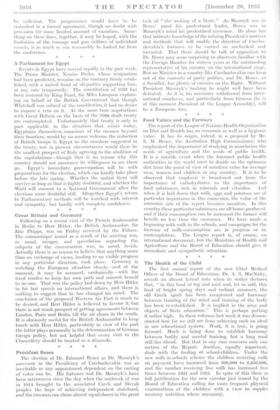A Parliament for .Egypt Events in Egypt have moved rapidly
in the past week. The Prime Minister, Nessim Pasha, whose resignation had been predicted, remains on the contrary firmly estab- lished, with a united front of all parties supporting him, at any rate temporarily. The constitution of 1923 has been restored by King Fuad, Sir Miles Lampson explain- ing on behalf of the British Government that though Whitehall was critical of the constitution, it had no desire to impose a veto on it. At the same time negotiations with Great Britain on the basis of the 1930 draft treaty are contemplated. Unfortunately that treaty is only in part applicable in the situation that exists today. Egyptians themselves, conscious of the menace beyond their frontiers, would by no means welcome the reduction of British troops in Egypt to the numbers suggested in the treaty, nor in present circumstances would there be the smallest prospect of Italy agreeing to the abolition of the capitulations—though that is no reason why this country should not announce its willingness to see them go. Egypt's immediate preoccupation will be with preparations for the election, which can hardly take place before the late spring. Whether the united front will survive as long as that is highly doubtful, and whether the Wafd will consent to a National Government after the elections more doubtful still. Altogether Egypt's return to Parliamentary methods will be watched with interest and sympathy, but hardly with complete confidence.
* *










































 Previous page
Previous page